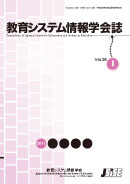Volume 28, Issue 1
Displaying 1-15 of 15 articles from this issue
- |<
- <
- 1
- >
- >|
Preface
-
2011Volume 28Issue 1 Pages 1-3
Published: January 31, 2011
Released on J-STAGE: July 27, 2018
Download PDF (275K)
Achievement and Service Awards
-
2011Volume 28Issue 1 Pages 5
Published: January 31, 2011
Released on J-STAGE: July 27, 2018
Download PDF (171K)
The Japanese Society for Information and Systems in Education 2010 Article Award
-
2011Volume 28Issue 1 Pages 6
Published: January 31, 2011
Released on J-STAGE: July 27, 2018
Download PDF (110K)
Special Issue: Education/Learning Support in Network Community
Editor's Message for the Special Issue
-
2011Volume 28Issue 1 Pages 7-8
Published: January 31, 2011
Released on J-STAGE: July 27, 2018
Download PDF (133K)
Reviews
-
2011Volume 28Issue 1 Pages 9-20
Published: January 31, 2011
Released on J-STAGE: July 27, 2018
Download PDF (677K) -
2011Volume 28Issue 1 Pages 21-35
Published: January 31, 2011
Released on J-STAGE: July 27, 2018
Download PDF (1078K) -
2011Volume 28Issue 1 Pages 36-49
Published: January 31, 2011
Released on J-STAGE: July 27, 2018
Download PDF (848K)
Original Paper
-
2011Volume 28Issue 1 Pages 50-60
Published: January 31, 2011
Released on J-STAGE: July 27, 2018
Download PDF (1151K)
Practical Papers
-
2011Volume 28Issue 1 Pages 61-70
Published: January 31, 2011
Released on J-STAGE: July 27, 2018
Download PDF (683K) -
2011Volume 28Issue 1 Pages 71-79
Published: January 31, 2011
Released on J-STAGE: July 27, 2018
Download PDF (767K) -
2011Volume 28Issue 1 Pages 80-93
Published: January 31, 2011
Released on J-STAGE: July 27, 2018
Download PDF (2217K) -
2011Volume 28Issue 1 Pages 94-107
Published: January 31, 2011
Released on J-STAGE: July 27, 2018
Download PDF (1614K)
Practical Reports
-
2011Volume 28Issue 1 Pages 108-114
Published: January 31, 2011
Released on J-STAGE: July 27, 2018
Download PDF (951K) -
2011Volume 28Issue 1 Pages 115-121
Published: January 31, 2011
Released on J-STAGE: July 27, 2018
Download PDF (709K)
Community Plaza
-
2011Volume 28Issue 1 Pages 122-126
Published: January 31, 2011
Released on J-STAGE: July 27, 2018
Download PDF (1533K)
- |<
- <
- 1
- >
- >|
